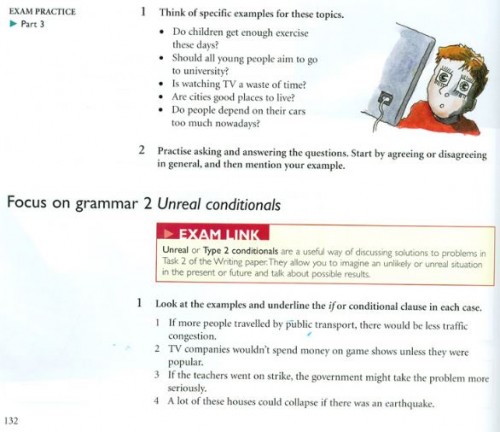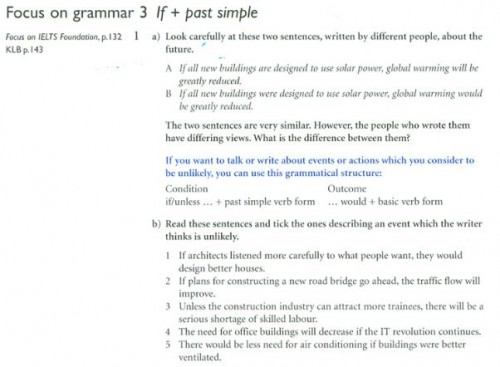Using conditional sentences to improve IELTS essay writing
Eden BroughAs most of us will know from experience, conditional forms in English can cause great difficulty for second language learners. Not only are they linguistically and cognitively complex but they also come in many forms. However, mastering these forms can bring great benefits, particularly in boosting our students’ IELTS scores. To achieve a band 5 in their writing, for example, students need to at least attempt complex sentences, although these don’t have to be as accurate as their simple sentences. Using first and second conditional sentences is one way for them to demonstrate ‘good’ grammar, with independent and subordinate clauses, while functionally providing support for their written arguments.
Traditional first and second conditionals in IELTS essay writing
First conditional forms are usually classified as ‘predictive’ conditionals and so may occur in academic writing as steps in presenting an argument, where one event is a predictable result of another condition. We can find a good example of this in Unit 12 of the textbook Focus on Skills for IELTS Foundation (Pearson Longman), on the topic of the environment, specifically global warming:
“If all new buildings are designed to use solar power, global warming will be greatly reduced”. (p. 131)
On the other hand, second conditionals express possible outcomes of more hypothetical situations. In the same textbook these results are described as unlikely, comparing the following sentence to the example given above.
“If all new buildings were designed to use solar power, global warming would be greatly reduced”.
The difference here is that the writer considers it unlikely (or at least less likely) that new buildings will be designed to use solar power.
Sources of difficulty for Emirati learners
Second conditional forms are regarded as more problematic than first conditionals for Arabic-speaking learners. For example, they might see the simple past forms and automatically assume they express past time rather than ‘unreal’ situations. My own students’ writing provides support for this view. After presenting and reviewing both conditional forms at different times, I encouraged the students to use conditional sentences when writing two practice essays. The first question was an agree-or-disagree type which also asked for possible solutions to an environmental problem; the second was a more straightforward agree-or-disagree type concerning the harmful effects of television. In the first case, about half of the students used conditional sentences in their writing, with the majority being first conditional sentences. In the second case there were slightly fewer examples, but again the majority were first conditionals. In terms of accuracy, most of these sentences contained errors but were still comprehensible first conditional sentences. For example:
*If the cost of petrol increase, the cost of transports will be increase like taxis and buses.
*If all people around the world gather together for make this problem to be less it will work.
*If we organize our time on watching TV it will be good but if not it will be dangerous.
However, there were few attempts at using past forms in conditional sentences and these all demonstrated a mismatch in the clauses. For example:
*Some people spent much time behind the TV and they didn’t care about who around specially if all family set together.
*If every country tried just to save just her area the world will be safe.
Materials for teaching conditionals
Writing traditional first and second conditional sentences is an effective way for students to support their opinions in a variety of essay types. This is because they indicate the writer’s ability to reason about alternatives and uncertainties. Clearly it is important that IELTS course books present (or review) and practice first and second conditional forms, and I would recommend two textbooks as a source of additional material for our students: Focus on IELTS Foundation and Focus on Skills for IELTS Foundation. In the former book, conditional sentences are clearly related to supporting ideas as they are presented between a speaking exercise on supporting examples and a problem-solution writing task.

In Focus on Skills for IELTS Foundation, the second conditional is presented by explicitly comparing it with the first conditional (p.131). This is particularly useful for my students as a way of increasing the ways that they can write complex sentences to support their opinions, given their apparent over reliance on first conditional forms.

What can we do?
As a way of helping our students to improve their IELTS essay writing I would suggest that:
a) the use of second conditional form is presented to students as a way of supporting their ideas by positing alternative situations or results;
b) the second conditional is contrasted with the first conditional in order to clarify its usage; and
c) students are encouraged to contrast the conditional forms with those in their own language.
Hopefully, as a result of this, students will improve their writing skills by producing a greater range of complex sentences, thus increasing their chances of achieving higher IELTS writing bands.